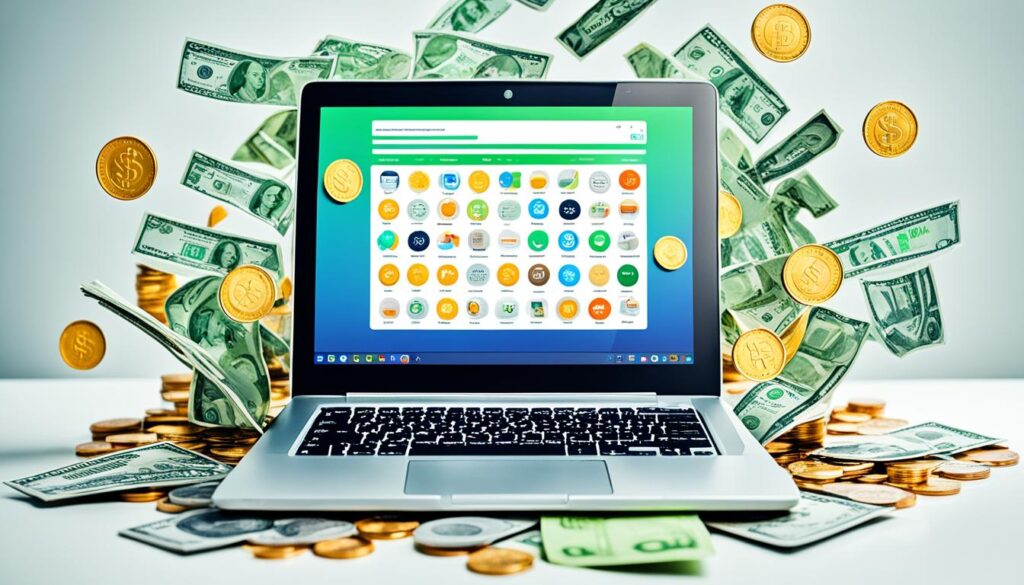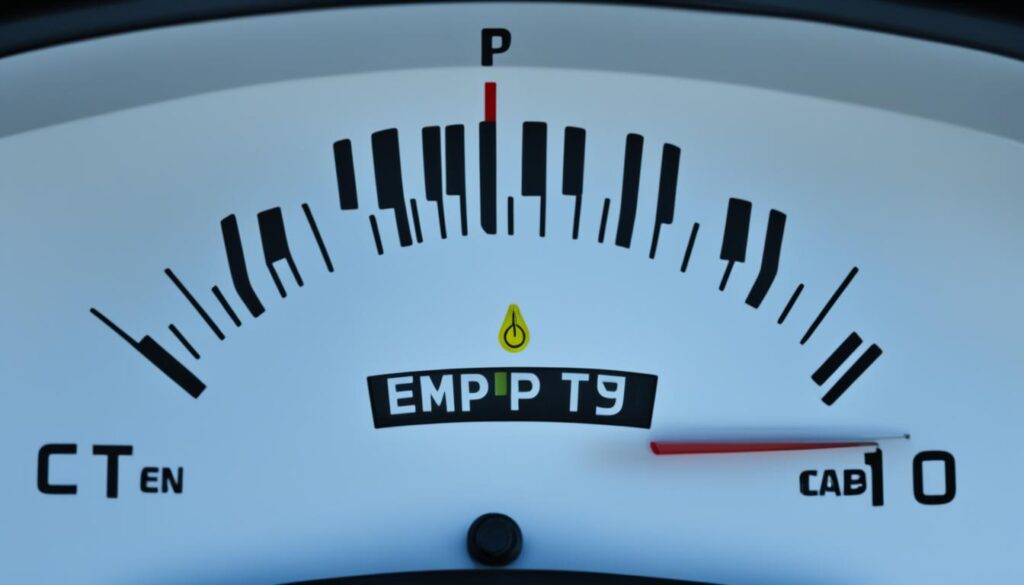Looking for ways to save money? You’re in the right place. Whether you want to slash expenses, grow your savings, or get better at managing money, we’ve got you covered. Here are easy ideas to spend less and save more every day.

Key Takeaways:
- Incorporate these practical money-saving tips into your daily routine.
- Automate transfers to your savings account for effortless saving.
- Collect spare change and small bills to steadily build up your savings.
- Plan your grocery shopping, use coupons, and take advantage of loyalty programs for budget-friendly groceries.
- Minimize restaurant spending by reducing the frequency of dining out and looking for ways to save.
Automate Transfers for Easy Savings
Saving money becomes easy with automated transfers from your checking to your savings account. Setting up automatic transfers means some of your income goes straight into savings. You won’t even have to think about it.
When you’re saving for big goals, like an emergency fund or a vacation, automated transfers help a lot. They let your savings grow over time, getting you closer to your dreams.
Many tools and apps can help make saving automatic. Apps like Digit and Qapital look at how you spend and save. They then transfer a little money to your savings based on what you earn and spend. These apps make saving effortless and fast.
If you like more traditional banking, many banks let you set up regular transfers. You can choose when these happen, like on certain dates or after you get paid. This keeps your savings growing smoothly.
Automated transfers do more than just simplify saving. They also discipline your finances. By stopping you from spending what you planned to save, they help keep your budget in line. This gets you closer to your financial goals.
Count Your Coins and Bills
When it comes to saving money, every little bit helps a lot. You can easily boost your savings by saving change and small bills. Just by putting aside your spare cash, your savings will grow over time.
Having physical money to save can improve your budgeting skills. It also stops you from making quick buys you might regret. Seeing your money pile up makes you think hard before spending it on things you don’t need.
This savings method won’t make you rich overnight. But it has great slow-and-steady savings benefits. By saving small amounts regularly, you’ll build up a good amount of money over time.
Building Your Coin and Bill Savings
Want to start saving your spare change and small bills? Here’s how:
- Find a jar, container, or piggy bank for your coins and bills.
- At the end of each day, empty your pockets or wallet into it.
- Keep track of how much you save to stay motivated.
- Once you have a lot saved, put it into your savings account.
Stick with this method, and you’ll be surprised at how much you can save. It’s like discovering hidden money on purpose!
“Saving money is a marathon, not a sprint. Little by little, your savings will grow. This makes a big difference in your finances.” – Savings Guru
Maximizing Your Coin and Bill Savings
For those who want to save even more, try these tips:
- Budget Your Coins: Give your saved money a purpose. It could be for a holiday, an emergency, or just for fun.
- Create Savings Challenges: Make saving a game. Set a goal, like saving a certain amount by a deadline.
- Involve the Whole Family: Get your family or housemates to join in. Everyone’s spare change can add up quickly.
A penny saved is a penny earned. Start saving your coins and bills now. You’ll soon see how effective steady saving can be!
| Benefits of Counting Coins and Bills | Tips for Maximizing Savings |
|---|---|
| 1. Encourages budgeting skills | 1. Assign a purpose for your saved coins |
| 2. Discourages impulsive spending | 2. Set savings goals and challenges |
| 3. Cultivates patience and discipline | 3. Involve your family or roommates |
| 4. Builds slow-and-steady savings |
Prep for Grocery Shopping
Grocery shopping is a big area to cut costs. By planning meals and making shopping lists, you save a lot. Also, skipping impulse buys helps. Using coupons, loyalty programs, and cash-back credit cards also boosts your savings. Shopping at places like Costco for bulk items is smart.
Meal planning helps stick to your budget and cuts impulsive buys. Planning meals ahead lets you list only what’s needed. This reduces waste and avoids unneeded buys.
“Meal planning is an effective way to stay within your budget and avoid spontaneous purchases.”
Using coupons also cuts grocery bills. Look for them in papers, magazines, online, and store apps. They offer discounts or buy-one-get-one deals. Always check their expiry and use them in time. Pair coupons with sales or loyalty deals for extra savings!
Loyalty programs at stores reward regular shoppers. They offer discounts, special sales, or cashback. Signing up is free and saves money over time.
Create a Shopping List Using a Mobile App
Using an app for your shopping list is smart. Many apps out there make it easy to manage. They also have features for recipes, price checks, and finding aisles, making shopping smoother and cheaper.
Consider shopping at wholesale stores too. Places like Costco sell in bulk, saving you money long-term. Just compare prices first and buy in bulk only if it fits your budget.

To sum up, these strategies make grocery shopping cheaper. Plan meals and make lists to avoid extra buys. Use coupons, loyalty programs, and credit cards for more savings. And think about bulk buying at wholesale stores. These tips help stay within your budget.
Minimize Restaurant Spending
Eating out is fun but it can get pricey. Luckily, there are ways to save money and still have a great time. Use these tips to cut back on dining costs.
1. Reduce the frequency of eating out
Enjoying a meal out is nice. However, it’s wise to watch how much you do it. To save money, eat at home more and treat dining out as something special.
2. Opt for appetizers or sharing entrees
When dining out, try saving by ordering appetizers or sharing dishes. This not only cuts cost but lets you sample more food.
3. Take advantage of restaurant rewards
Some credit cards give you benefits for restaurant spending. You could get cash back or points for dining. Always use these cards when eating out to save more.
| Restaurant Rewards Program | Description |
|---|---|
| Rewards Program A | Earn 5% cash back on restaurant purchases |
| Rewards Program B | Get a free appetizer or dessert for every 5 meals purchased |
| Rewards Program C | Collect points for dining out and redeem them for gift cards |
4. Look for dining specials and promotions
Look for deals like happy hour or off-peak specials. These can make dining out more affordable.
Tip: Sign up for restaurant newsletters or follow them on social media for deals.
By being smart about dining costs, you can enjoy restaurants without spending too much. Plan and be mindful to lower your expenses.

Get Discounts on Entertainment
Entertainment costs can be high. To cut them down, look for free or cheaper activities. Many museums and national parks have free days. You can also find free concerts and events in local communities. Don’t forget to ask about discounts for seniors, students, or military personnel.
For fun yet affordable activities, here are some good choices:
1. Free Events
Look out for free events nearby. You might find outdoor movies, live music, street festivals, and more. Check local newspapers, community websites, and social media for event news.
2. Discounted Tickets
Want a fun night out or to celebrate something special? Seek out discounted tickets. Theaters, amusement parks, and other attractions often have deals. Check Groupon and LivingSocial for discounts on tickets and activities.
3. Entertainment Expenses
Think about your entertainment spending. Could you cancel or downgrade some subscriptions or memberships? Reducing streaming services and monthly fees can save you money over time.
Remember, you don’t have to give up fun to save money. Being smart and looking for free or cheaper options can help you have a great time without spending a lot.

Map Out Major Purchases
Timing is key when buying big-ticket items. Planning purchases around sale times can save lots of money. Retailers often have sales on various products throughout the year. Knowing these times helps you buy things like electronics or clothes without spending too much.
“Timing major purchases can result in significant savings.”
To save big, plan your shopping ahead of time. Find out the best times to buy what you need. This way, you can avoid buying on impulse and wait for the best sale.
Online Shopping Tools
There are tools online to help with purchase timing and finding deals. The Camelizer and Honey browser extensions track prices and alert you to discounts. These options make it easier to buy at the right time.

Apps like ShopSavvy also help by comparing prices at different stores. They ensure you pay the lowest price for what you need. Tools like these are great for smart shopping.
Planning and Savings
Timing purchases right and using online tools can help you save money. Make the most of sales, do your research, and compare before buying. With careful planning, you’ll enjoy getting what you want for less.
Restrict Online Shopping
Online shopping can lead to buying things we don’t need. To take charge of your money, it’s crucial to cut down on impulsive shopping. Here are a few tips to help you shop smarter:
Avoid Saving Billing Information
Not saving your payment details on sites can help. It adds an extra step before you buy. This makes you think twice about if you really need the item.
Delete Shopping Apps
Deleting shopping apps from your phone can reduce the urge to buy. Without these apps, you won’t get constant reminders to shop. This helps you focus on your financial goals.
Implement a 30-Day Rule
Waiting 30 days before buying can curb impulse buys. Think over the purchase in this time. You might find you don’t want the item after all.
“By cutting down on impulse buys and shopping smartly, you can manage your money better and make thoughtful choices.”

Changing your shopping habits takes effort. By not saving your payment details, removing shopping apps, and waiting 30 days, you’ll shop more wisely. This means making choices that are good for your wallet.
Get Creative with Gifts
Gift-giving doesn’t have to be expensive. There are many thoughtful, yet affordable, ways to show you care. Consider affordable gift ideas and handmade gifts. These will make your loved ones feel special without emptying your wallet.
Affordable Gift Ideas
Looking for affordable gifts requires creativity. Herb gardens are a great idea. They beautify a home and offer fresh cooking ingredients. Books are another excellent option. They can transport the reader to another world or teach them new things.

Handmade Gifts
Handmade gifts show your personal touch. You could make personalized photo albums, handmade jewelry, or knit scarves. These special gifts will be treasured by your loved ones and are budget-friendly.
Budget-Friendly Celebrations
Gifts don’t always need to be physical items. You can give experiences like day trips or picnics. Or, perhaps, a homemade dinner or a spa day at home. These create memories and show deep care without spending a lot.
Planning is key to keeping gifts affordable. Setting up a savings bucket for gifts allows you to save money all year. This way, you’re ready for special occasions without financial stress.
Also, watch for sales and discounts around holidays like Independence Day or Black Friday. Strategic shopping during these times means great finds at lower prices. This helps in saving money while gift-giving.
Lower Your Car Costs
Owning a car can be pricey. But, you can reduce car expenses with a few strategies. These tips will help you save on car maintenance and transportation expenses.
Refinance Your Auto Loan
High interest on your auto loan can be a burden. Refinancing at a lower interest rate can significantly lower your car costs. Look around to find the best offers that fit your budget.
Shop Around for Cheaper Car Insurance
Car insurance is necessary but shouldn’t break the bank. It’s crucial to compare rates from different companies. Find discounts or bundle policies if you can. This way, you’ll keep more money in your pocket over time.
Optimize Fuel Efficiency
Fuel costs add up when you own a car. To cut down on these, adopt fuel-saving driving habits. Avoid quick starts and get rid of extra weight in your car. Also, try to drive less by planning your routes better. This will help you save money on fuel.

Explore Carpooling Options
Carpooling is a great way to lower transportation expenses. Team up with friends or coworkers who go the same way to work. This can cut your fuel costs and reduce wear on your car. Plus, carpooling is better for the environment because it means fewer cars on the road.
You can manage your car costs with these strategies. Refinancing loans, finding cheaper insurance, saving fuel, and carpooling are key. Try these out to make owning a car more affordable.
Reduce Your Gas Usage
Want to save on fuel costs? There are easy steps you can take. You might not control gas prices, but you can boost your car’s fuel efficiency. Using gas apps helps you find the cheapest prices nearby. This way, you can always fill your tank at the best price.
Merging errands and planning ahead can also lower your gas bills. Avoiding extra trips cuts down on gas use and saves money. If you can, use public transport. It’s cheaper and better for the planet than driving alone.
Walking or biking for short trips is great for your health and your pocket. Carpooling is another smart move. It cuts down on costs and is kinder to the environment.